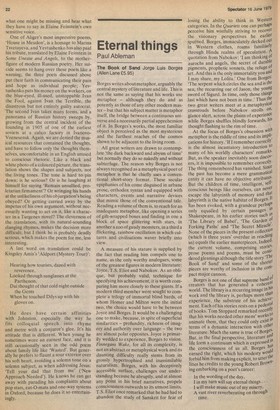Eternal things
Paul Able man
The Book of Sand Jorge Luis Borges (Allen Lane £5.95) Borges writes about metaphor, arguably the central mystery of literature and life. This is not the same as saying that his works use metaphor — although they do and as potently as those of any other modern master — but that his subject matter is metaphor itself, the bridge between a continuous universe and a necessarily partial apprehension of it. In Borges's works, the most familiar object is perceived as the most mysterious and the furthest reaches of the cosmos shown to be adjacent to the living room.
All great writers are drawn to contemplate 'the dark backward and abysm of time' but normally they do so nakedly and without subterfuge. The reason why Borges is not always recognised as a metaphysical poet of metaphor is that he chiefly uses a conventional short-story format. These secular epiphanies of his come disguised in urbane prose, orthodox syntax and equipped with characters, events and narrative devices that mimic those of the conventional tale. Reading a volume of them is, to reach for an inadequate metaphor, like opening a series of gift-wrapped boxes and finding in one a block of space glittering with stars, in another a zoo of gaudy monsters, in a third a flickering, rainbow oscillation in which cultures and civilisations waver briefly into view.
A measure of his stature is supplied by the fact that reading him compels one to name, as,the only worthy analogues, some of the greatest figures in modern literature: Joyce, T.S. Eliot and Nabokov. As an oblique, but probably valid, technique for specifying his achievement, it is worth comparing him more closely to these giants. If a modern third member were sought to complete a trilogy of immortal blind bards, of whom Homer and Milton were the initial two, the choice would have to be between Joyce and Borges. It would be a challenging one to make, because, in spite of superficial similarities — profundity, richness of imagery and authority over language — the two are almost polar opposites. Joyce is primarily wedded to experience, Borges to vision. Finnegans Wake, for all its complexity, is not an abstract or metaphysical work and its daunting difficulty really stems from its grossly hypertrophied and inassimilable naturalism. Borges, with his deceptively accessible surface, challenges our understanding because he abruptly, and at almost any point in his brief narratives, propels consciousness outwards to its utmost limits. T.S. Eliot once remarked that he had had to abandon the study of Sanskrit for fear of losing the ability to think in Western categories. In the Quartets one can perhaps perceive him wistfully striving to recover the visionary perspectives he earlier spurned. Borges, immaculately decked out in Western clothes, roams familiarly through Hindu realms of speculation. A quotation from Nabokov: 'I am thinking of aurochs and angels, the secret of durable pigments, prophetic sonnets, the refuge ef art. And this is the only immortality you and I may share, my Lolita.' One from Borges: 'The serpent which circles the sea and is the sea, the recurring oar of Jason, the young sword of Sigurd. In time, only those things last which have not been in time.' Thus the two great writers meet at a metaphysical crossroads before Nabokov strolls on, glance alert, across the plains of experience while Borges shuffles blindly forwards, his thought flashing to the rim of time. At the focus of Borges's obsession with metaphor is the riddle of time and its imPlications for history. 'If I remember correctly' is the almost incantatory introduction to many of his worldly characters' remarks. But, as the speaker inevitably soon discovers, it is impossible to remember correctly. The thing remembered has vanished. Since the past has become a mere grammatical entity it can have no objective attributes. But the children of time, intelligent, selfconscious beings like ourselves, can never escape the labyrinth of memory and that labyrinth is the native habitat of Borges. It has been evoked, with a grandeur perhaPs only equalled by certain passages in Shakespeare, in his earlier stories such as The Library of Babel', 'The Garden of Forking Paths' and 'The Secret Miracle'. None of the pieces in the present collection (which is three years' overdue in reaching us) equals the earlier masterpieces. Indeed, the current volume, comprising stories, prose poems and poems, must be considered gleanings although the title story 'Tile Book of Sand' and some of the shorter pieces are worthy of inclusion in the corn' pact major cannon. f Borges is not one of that supreme band a creators that has generated a coherenl world. The library is a recurring image in his work and the library is, perhaps more than experience, the substrate of his achieve; ment. Each of his stories rests on a pedestal of books. Tom Stoppard remarked recent , that his works needed other mens' works t° animate them, that they could only exist ill terms of a dynamic interaction with other literature. Much the same is true of Borges, But, in the final perspective, literature at life form a continuum which is expressed in the consciousness of us all. Borges hads earned the right, which his modesty w0l1,1 forbid him from making explicit, to utter tne lines he credits to the young Robert Brown" ing embarking on a poet's career: In the wording of the day, I in my turn will say eternal things . . • I will make music out of my misery, A vast river reverberating on through time.


































 Previous page
Previous page